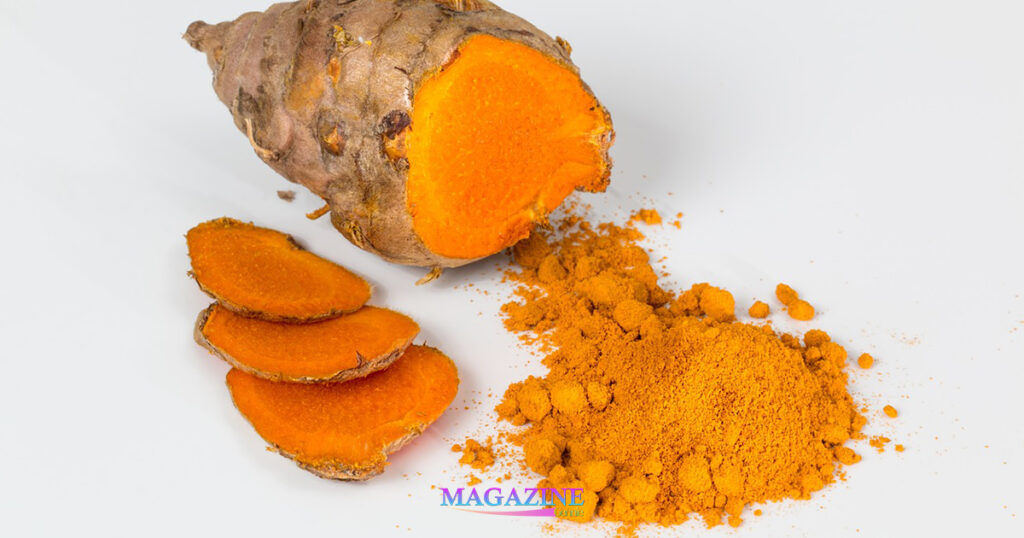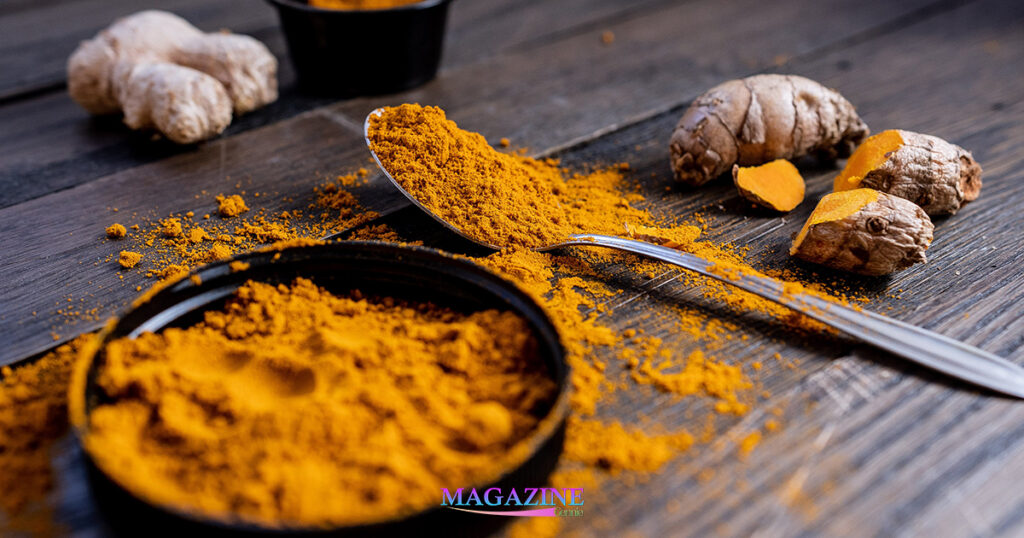Introduction
Turmeric, scientifically known as Curcuma longa, is a vibrant yellow spice commonly used in culinary practices and traditional medicine. Renowned for its potent medicinal properties, turmeric has been cherished for centuries, particularly in Ayurvedic and Chinese medicine. Its active compound, curcumin, holds remarkable anti-inflammatory and antioxidant qualities, aiding in combating various ailments.

From supporting joint health to potentially reducing the risk of chronic diseases, including heart conditions and certain cancers, turmeric offers a wide array of health benefits. Additionally, its antimicrobial properties contribute to boosting immunity and promoting overall well-being. Incorporating turmeric into one’s diet or utilizing it topically may harness its numerous health advantages, making it a valuable natural remedy in maintaining a healthy lifestyle.
Table of Contents
Turmeric Benefits for Women:

- Hormonal Balance: Turmeric aids in balancing hormones, particularly beneficial for women dealing with menstrual irregularities and menopause symptoms.
- Anti-inflammatory Properties: Reduces inflammation associated with conditions like PCOS, endometriosis, and fibroids, potentially easing discomfort.
- Skin Health: Helps improve skin complexion, fights acne, and assists in managing conditions like eczema and psoriasis.
- Fertility Support: Turmeric’s anti-inflammatory and antioxidant properties may support reproductive health and improve fertility in women.
- Menstrual Pain Relief: Known for its analgesic properties, turmeric can alleviate menstrual cramps and reduce overall discomfort during periods.
- Breast Health: Some research suggests turmeric may have a protective effect on breast health, potentially reducing the risk of certain breast issues.
- Heart Health: Turmeric may assist in maintaining cardiovascular health by reducing cholesterol levels and improving blood circulation.
- Mood Regulation: Its potential to regulate neurotransmitters may aid in managing mood swings and anxiety during hormonal fluctuations.
- Digestive Health: Turmeric can help alleviate digestive issues such as bloating, gas, and indigestion, common in women.
- Joint Pain Relief: Women experiencing joint pain or arthritis may benefit from turmeric’s anti-inflammatory properties, easing discomfort.
- Immune System Support: Boosts the immune system, aiding in fighting off infections and supporting overall health.
- Anti-aging Properties: Turmeric’s antioxidant content can combat free radicals, potentially slowing down the aging process and supporting youthful skin.
Turmeric Benefits for Men:

- Prostate Health: Some studies suggest turmeric may support prostate health, potentially reducing the risk of prostate issues in men.
- Anti-inflammatory Effects: Reduces inflammation in conditions like arthritis, potentially alleviating joint pain and discomfort in men.
- Heart Health: Turmeric’s ability to reduce cholesterol and support cardiovascular function benefits men’s heart health.
- Testosterone Regulation: Research indicates turmeric might help regulate testosterone levels, which is crucial for men’s reproductive health.
- Improved Cognitive Function: Turmeric’s anti-inflammatory and antioxidant properties may support brain health and cognitive function in men.
- Muscle Recovery: Its anti-inflammatory properties can aid in faster muscle recovery after workouts or physical activities.
- Digestive Health: Turmeric can assist in maintaining digestive health, reducing symptoms like bloating and gas in men.
- Enhanced Athletic Performance: Some evidence suggests that turmeric may improve endurance and physical performance in men.
- Liver Health: Turmeric supports liver function and detoxification, crucial for men’s overall health.
- Diabetes Management: Turmeric may help regulate blood sugar levels, benefiting men managing diabetes or insulin resistance.
- Immune System Support: Boosts the immune system, aiding in fighting off infections and supporting overall health in men.
- Anti-aging Properties: Turmeric’s antioxidants can combat free radicals, potentially slowing down aging effects and supporting overall vitality in men.
Best Way to Use Turmeric for Health
Turmeric is a popular spice known for its potential health benefits due to its active compound, curcumin, which has antioxidant and anti-inflammatory properties. Here are some ways to incorporate turmeric into your routine for health:
- Turmeric Tea or Golden Milk: Mix turmeric powder with warm milk and a dash of black pepper (which enhances curcumin absorption). You can add honey or a sweetener for taste. This soothing drink is often called golden milk and can be consumed daily.
- Turmeric in Cooking: Use turmeric powder in cooking various dishes like curries, soups, rice, or vegetable sautés. It not only adds flavor but also provides health benefits.
- Turmeric Supplements: Curcumin supplements are available and may be beneficial for those who want a concentrated dose of curcumin. Always consult with a healthcare professional before starting any new supplements.
- Turmeric Paste: Make a paste by mixing turmeric powder with water and a bit of black pepper. This paste can be added to dishes, smoothies, or applied topically for skin conditions.
- Turmeric in Salad Dressings or Smoothies: Add a pinch of turmeric powder to your salad dressings or blend it into your smoothies for an extra health boost.
Remember:
- Black Pepper: Adding black pepper to turmeric enhances the absorption of curcumin in the body due to the presence of piperine.
- Fat: Curcumin is fat-soluble, so consuming it with a source of healthy fat may improve its absorption. Consider using turmeric in dishes containing coconut oil, olive oil, or ghee.
While turmeric has numerous potential health benefits, it’s essential to note that individual responses may vary. Additionally, if you have any existing medical conditions or are taking medications, consult your healthcare provider before adding significant amounts of turmeric to your diet, especially in supplement form, to avoid any potential interactions.
Turmeric benefits for liver
Turmeric, a bright yellow spice commonly used in cooking, has been studied extensively for its potential health benefits, including its positive effects on the liver. The active compound in turmeric, called curcumin, is known for its antioxidant and anti-inflammatory properties, which can contribute to liver health in several ways:
- Detoxification: The liver plays a crucial role in detoxifying the body. Curcumin in turmeric supports the liver’s natural detoxification processes by enhancing the production of enzymes that help flush out toxins.
- Anti-inflammatory properties: Chronic inflammation can harm the liver and contribute to conditions like fatty liver disease. Curcumin’s anti-inflammatory properties may help reduce inflammation in the liver, thereby supporting its health.
- Protective effects: Studies suggest that curcumin may protect the liver from damage caused by certain toxins, alcohol, and other harmful substances. It can potentially prevent or reduce liver injury by promoting the regeneration of liver cells.
- Antioxidant activity: Turmeric contains antioxidants that help neutralize harmful free radicals in the body. By scavenging these free radicals, turmeric may help prevent oxidative stress in the liver, which can otherwise lead to liver damage.
- Support for liver conditions: Research indicates that turmeric may be beneficial in managing liver conditions such as non-alcoholic fatty liver disease (NAFLD), hepatitis, and liver cirrhosis due to its anti-inflammatory and antioxidative properties.
Turmeric benefits for hair
Turmeric is believed to offer several potential benefits for hair health:
- Promotes hair growth: Curcumin, the active compound in turmeric, may help stimulate blood circulation in the scalp, which can promote hair growth. Improved circulation means better nutrient delivery to hair follicles, potentially encouraging healthier and stronger hair.
- Prevents hair loss: Turmeric’s anti-inflammatory and antioxidant properties may help combat conditions like scalp inflammation, which can contribute to hair loss. Its antimicrobial properties may also help maintain a healthy scalp, reducing the risk of infections that can lead to hair fall.
- Soothes scalp conditions: Turmeric possesses antifungal and antibacterial properties that can help alleviate scalp conditions like dandruff and itching. Applying a turmeric paste or mask to the scalp may help calm these issues and promote a healthier scalp environment.
- Strengthens hair: Turmeric contains essential nutrients and vitamins that are beneficial for hair health. It can strengthen hair follicles and improve the overall texture of hair, making it less prone to breakage.
- Natural hair conditioner: When mixed with other natural ingredients like yogurt, honey, or coconut oil, turmeric can act as a natural hair conditioner. This mixture can hydrate and nourish the hair, making it smoother, shinier, and more manageable.
To utilize turmeric for hair benefits, you can create hair masks or mixtures by combining turmeric powder with other beneficial ingredients. However, be cautious as turmeric can stain clothing and surfaces. Perform a patch test before applying it to your scalp to check for any adverse reactions or allergies. If you experience any irritation, discontinue use and consult a dermatologist or healthcare professional.
Turmeric benefits for skin
Turmeric offers various potential benefits for skin health due to its powerful properties, particularly its active compound, curcumin:
- Anti-inflammatory properties: Curcumin in turmeric possesses potent anti-inflammatory properties that can help reduce redness, swelling, and irritation. It may be beneficial for conditions like acne, eczema, psoriasis, and other inflammatory skin issues.
- Antioxidant activity: Turmeric is rich in antioxidants, which help neutralize free radicals that can damage skin cells. This antioxidative effect can potentially slow down the aging process, diminish the appearance of fine lines, wrinkles, and age spots, and contribute to a more youthful-looking complexion.
- Treatment for acne: Its anti-inflammatory and antibacterial properties make turmeric beneficial in managing acne. Applying turmeric topically or using face masks with turmeric may help reduce acne-causing bacteria and soothe inflamed skin.
- Brightens skin: Turmeric is known for its skin-brightening effects. It can help even out skin tone, reduce pigmentation, and promote a healthy glow when used regularly.
- Wound healing: Studies suggest that turmeric’s antimicrobial properties aid in wound healing and may assist in minimizing scarring by speeding up the skin’s healing process.
- Exfoliation and skin renewal: Turmeric can act as a natural exfoliant, removing dead skin cells and promoting new cell growth. This exfoliating property can leave the skin looking brighter and feeling smoother.
When using turmeric for skin benefits, it’s essential to consider the following:
- Perform a patch test before applying turmeric topically to check for any allergic reactions or skin sensitivity.
- Turmeric can temporarily stain the skin, so it’s advisable to use it in combination with other ingredients like honey, yogurt, aloe vera, or coconut oil to minimize staining.
- Avoid using high concentrations of turmeric directly on the skin, as it might cause temporary yellow staining, especially in individuals with lighter skin tones.
- Consult a dermatologist or skincare professional, especially if you have sensitive skin or skin conditions, to determine the best way to incorporate turmeric into your skincare routine.
Overall, while turmeric offers potential skin benefits, individual responses can vary, and it’s essential to use it cautiously and in moderation to prevent adverse reactions.
Turmeric benefits for brain
Turmeric, particularly its active compound curcumin, has been investigated for its potential benefits for brain health and cognitive function. Some of the potential advantages include:
- Neuroprotective properties: Curcumin has shown promising neuroprotective effects. It may help protect against neurodegenerative conditions like Alzheimer’s disease by inhibiting the buildup of beta-amyloid plaques in the brain, which are characteristic of the disease.
- Anti-inflammatory effects: Chronic inflammation in the brain can contribute to neurological disorders. Curcumin’s potent anti-inflammatory properties may help reduce inflammation in the brain, potentially protecting against cognitive decline.
- Antioxidant activity: Turmeric contains antioxidants that combat oxidative stress. Oxidative stress can damage brain cells, and by neutralizing free radicals, turmeric may help preserve brain function and prevent age-related cognitive decline.
- Enhances cognitive function: Some research suggests that curcumin may enhance cognitive function and memory. It may support overall brain health by improving neurotransmitter function and promoting neural connectivity.
- Mood regulation: There’s evidence to suggest that curcumin could have a positive impact on mood. It may help alleviate symptoms of depression and anxiety by modulating neurotransmitters such as serotonin and dopamine.
However, it’s important to note that while these potential benefits are promising, more extensive research is needed to fully understand the impact of turmeric and curcumin on brain health. Additionally, the bioavailability of curcumin (how well it is absorbed and utilized by the body) is relatively low, which can limit its effectiveness.
Incorporating turmeric into your diet, along with black pepper (which can enhance curcumin absorption), or considering curcumin supplements under the guidance of a healthcare professional might be ways to potentially derive brain health benefits from this compound. Always consult with a healthcare provider before starting any new supplement regimen, especially if you have existing health conditions or are taking medications.
Turmeric benefits for bones
Turmeric offers potential benefits for bone health due to its active compound curcumin and other properties:
- Anti-inflammatory effects: Chronic inflammation can negatively impact bone health by contributing to conditions like osteoporosis. Curcumin’s anti-inflammatory properties may help reduce inflammation in the body, which could potentially support bone health.
- Antioxidant activity: Turmeric contains antioxidants that combat oxidative stress, which can weaken bones. By neutralizing free radicals, turmeric may help protect bone cells and prevent oxidative damage.
- Bone density support: Some studies suggest that curcumin may help in preserving bone density. Maintaining bone density is crucial in preventing conditions like osteopenia or osteoporosis, as it reduces the risk of fractures and bone-related issues.
- Assists in bone healing: Turmeric’s ability to reduce inflammation and support the body’s natural healing processes may aid in bone repair and recovery from injuries.
- Joint health: Turmeric’s anti-inflammatory properties may also benefit joint health. Conditions like rheumatoid arthritis, which affect the joints, may see some relief due to the anti-inflammatory effects of curcumin.
Incorporating turmeric into your diet or considering curcumin supplements might potentially contribute to better bone health. However, it’s crucial to keep in mind that while turmeric shows promise in supporting bone health, more research is needed to fully understand its direct impact and effectiveness on bones. Additionally, if you have any existing bone-related conditions or concerns, it’s advisable to consult a healthcare professional before making significant dietary changes or starting any new supplement regimen.
Turmeric benefits for kidney
Turmeric, particularly its active compound curcumin, has been studied for its potential benefits for kidney health. Some potential advantages include:
- Anti-inflammatory properties: Curcumin in turmeric possesses potent anti-inflammatory effects, which may help reduce inflammation in the kidneys. Chronic inflammation can contribute to various kidney issues, and curcumin’s anti-inflammatory properties might offer protective effects.
- Antioxidant activity: Turmeric contains antioxidants that can neutralize harmful free radicals in the body. By scavenging these free radicals, turmeric may help reduce oxidative stress in the kidneys, potentially protecting them from damage caused by oxidative stress.
- May protect against kidney disease: Some animal studies suggest that curcumin might offer protection against certain kidney diseases by reducing inflammation, oxidative stress, and fibrosis in the kidneys. However, more research, particularly human clinical trials, is needed to confirm these effects.
- Supports detoxification: The kidneys play a crucial role in filtering toxins from the body. Some studies indicate that turmeric may support the body’s natural detoxification processes, which indirectly benefits kidney health by reducing the workload on these organs.
- May help manage kidney stones: Turmeric’s potential anti-inflammatory and antioxidant properties might contribute to managing conditions like kidney stones. It’s believed that these properties could help prevent the formation of certain types of kidney stones.
While these potential benefits are promising, it’s essential to note that scientific research on turmeric specifically for kidney health is still in its early stages. As such, the extent of its benefits and the appropriate dosage for kidney health are not yet well-established. If you have kidney disease or any kidney-related issues, it’s crucial to consult with a healthcare professional before using turmeric or curcumin supplements, as it might interact with medications or exacerbate certain kidney conditions. Always seek professional medical advice for personalized recommendations.
Turmeric benefits and side effects
As we Already mentioned above all points supports the benefits of turmeric.
While turmeric is generally considered safe for most people when consumed in amounts typically found in food, excessive intake or certain individuals may experience side effects. Some potential side effects of turmeric include:
- Stomach issues: Turmeric may cause gastrointestinal problems such as stomach upset, nausea, diarrhea, or indigestion in some individuals, particularly when taken in high doses or on an empty stomach.
- Allergic reactions: Some people may be allergic to turmeric, experiencing allergic reactions like rashes, itching, or difficulty breathing. If you have a known allergy to plants in the Curcuma family (such as ginger or yellow food coloring), you may have an increased risk of allergic reactions to turmeric.
- Interference with certain medications: Turmeric can interfere with blood clotting and might interact with blood-thinning medications like warfarin or aspirin, increasing the risk of bleeding. It may also interact with drugs that reduce stomach acid or diabetes medications.
- Risk during pregnancy: While culinary amounts of turmeric used in cooking are generally considered safe during pregnancy, consuming medicinal amounts or supplements may have adverse effects. It’s advisable for pregnant women to consult their healthcare provider before using turmeric supplements.
- Gallbladder issues: Turmeric might worsen gallbladder problems or lead to gallstones in some cases due to its ability to increase bile production.
- Skin irritation: Applying turmeric directly to the skin may cause irritation or allergic reactions, especially in individuals with sensitive skin.
It’s important to note that these side effects are usually associated with high doses of turmeric or curcumin supplements rather than the amounts typically used in cooking. If you’re considering using turmeric supplements for health purposes or if you have any existing health conditions or are taking medications, it’s crucial to consult a healthcare professional before starting to avoid potential interactions or adverse effects.
FAQs about Turmeric Benefits:
1. Can turmeric be consumed daily?
- Yes, in moderation. However, excessive intake may lead to digestive issues.
2. How can turmeric be consumed?
- Turmeric can be taken as a supplement, added to food, or consumed as a tea.
3. Are there any side effects of turmeric consumption?
- Some people may experience stomach upset or allergic reactions. It’s advisable to consult a healthcare professional before consuming in large amounts.
4. Can turmeric interact with medications?
- Turmeric may interact with blood thinners and medications for diabetes or stomach acid reduction. Consult a healthcare professional if you’re on medication.
5. Is turmeric safe during pregnancy?
- Pregnant women should consult their doctors before consuming turmeric supplements as high doses may have adverse effects on pregnancy. However, using it in small amounts as a spice in cooking is generally considered safe.
Remember, while turmeric offers numerous health benefits, individual responses can vary. Consulting a healthcare professional before incorporating it into your daily routine is recommended, especially if you have existing health conditions or are on medication.



